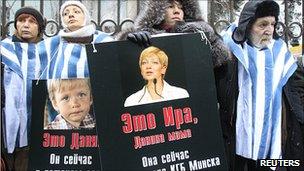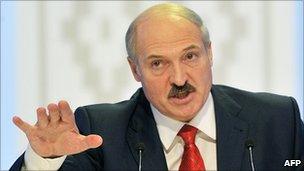Belarus boy in custody tug-of-war after arrests
- Published

Activists have rallied for Irina Khalip and her son outside the Belarus embassy in Moscow
A woman in Belarus is battling to prevent the authorities taking custody of her infant grandson, whose parents are jailed opposition activists.
Lyutsina Khalip said Danil, aged three-and-a-half, "asks constantly where his mum and dad are".
His parents, Andrei Sannikov and Irina Khalip, were arrested after an opposition rally on 19 December at which police clashed with protesters.
Observers have said President Alexander Lukashenko's re-election was flawed.
Police arrested hundreds of people including opposition candidates in the capital Minsk after the election. Many are still being held at a KGB state security centre.
So far 31 have been charged in connection with the opposition protests, Interfax news agency reports.
Medical checks
Lyutsina Khalip, whose jailed daughter Irina is an investigative journalist, said she had had to prove to child welfare officers that she was capable of looking after Danil.
"They suggested that perhaps I wasn't well enough to look after him. I told them I had everything he needed. I applied to be his guardian," she told the Europe Today programme on the BBC World Service.
"In the last few days I've been running back and forth from place to place, to prove that I'm not mad, not taking drugs and don't have any sexual diseases.
"They now say I'm medically well enough," she said, but added that Danil had also undergone a medical check, including a blood test.
"They'll check where I live to see if it's suitable, then they'll decide my grandson's fate," she said.
Irina's husband, Andrei Sannikov, was an opposition candidate in the 19 December presidential election, which Mr Lukashenko won with nearly 80% of the vote.
Mr Sannikov was severely beaten, suffering leg injuries, and was denied proper medical treatment, his lawyer Pavel Sapelko said.
A Belarus foreign ministry spokesman, Andrei Savinykh, said the detained opposition activists "have access to lawyers and all their rights within the investigation process are being honoured".
He accused opposition activists of having tried to organise "a political upheaval that was outside all legal scenarios".
Western criticism

President Lukashenko has kept an iron grip on Belarus for 16 years
The former Soviet republic saw violent unrest as Mr Lukashenko's election victory was tarnished by fraud allegations.
Election monitors from the European human rights watchdog, the OSCE, said many of the vote counts had been "very bad".
The Belarus authorities later closed the mission of the OSCE (Organisation for Security and Co-operation in Europe).
Media reports say the KGB has carried out a wave of searches at the homes of opposition activists and journalists, in some cases seizing computers and disks.
The 27 EU member states are considering whether to reimpose a travel ban on Mr Lukashenko and his top aides. An announcement is expected at an EU foreign ministers' meeting on 31 January.
In 2006 the EU imposed visa bans on Mr Lukashenko and 35 ministers, prosecutors and election officials. Their assets in the EU were also frozen, signalling EU irritation over the repression of Belarus opposition activists.
The travel restrictions were eased for all but five of the officials in 2008, when Belarus dissidents were released from jail.
Last week, Swedish Foreign Minister Carl Bildt said "those who took part in the actions... and those who collaborated with them will inevitably come back on the list".
The euobserver.com news website asked him if Mr Lukashenko would be among those facing a new ban, to which he replied: "I find it highly likely that he was involved in the actions which took place".
Belarus will remain in the EU spotlight on Wednesday, when the Belarus Foreign Minister, Sergei Martynov, meets EU officials in Brussels.
The European Parliament will also hold an extraordinary meeting on Belarus on Wednesday evening in Brussels.
MEPs specialising in foreign affairs and human rights will join European Parliament President Jerzy Buzek for the talks. Last month he called for "the immediate release of political prisoners and for an immediate end to the violence by the authorities".
Similar calls have come from EU foreign policy chief Baroness Ashton, US Secretary of State Hillary Clinton and UN Secretary General Ban Ki-moon.
- Published31 December 2010
- Published30 December 2010
- Published21 December 2010